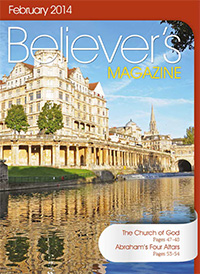Has the new covenant with Israel and Judah already been made, or is it still future? If the latter, when and how will it be applied?
From the prophecy of Jeremiah 31.31 we find the new covenant is not yet made with the two houses of Israel and Judah, but awaits fulfilment in the future, for note what Jeremiah declares in the future prophetic tense: "Behold, the days come, saith the Lord, that I will make a new covenant with the house of Israel, and with the house of Judah". There should not be a difficulty here. Those of the Jews and we of the Gentiles, who now believe in Christ, come into the distinct position as one body, but possessing all the moral and spiritual blessings of the new covenant. The fulfilment of it pertains to the Jewish people in the last days, when the Messiah comes to reign over them. The Lord Jesus died for that nation and not that nation only, but that also He should gather together in one the children of God that were scattered abroad (Jn 11.52). The Lord's death will avail for both purposes; the time and order of applying it is another question. In fact, we know that Israel as a nation rejected the message and hence the blessing remains in abeyance until the fullness of the Gentiles is come in.
When the Redeemer shall come to Zion and out of Zion (for both are true) "all Israel shall be saved". Of course we believe that all the efficacious value for Israel then as for us now is in the blood of Christ. Israel then will have sacrifices as well as an earthly temple and priesthood, but these will be only commemorative signs of the one great offering of Christ (see Ezekiel chs. 44 to 46). The Epistle to the Hebrews excludes these for the Christian. Israel restored will enjoy the new things of the new covenant. They will have a new sanctuary, a new sovereign in Christ, a new status as a nation, a new soil in the land (Ezek 36.34-35), a new stream of life and healing flowing through the land (Ezek 47) and a new spirit (Ezek 36.25-27).
John J Stubbs
Is it in order for a Christian to carry an organ donor card to "give others the gift of life" (National Health Service quote)?
First of all, it should be borne in mind that the believer's body is most precious to God. Indeed our salvation will not, in one sense, be complete until our bodies (these bodies of "our humiliation") will be changed and "fashioned like unto his glorious body" (Phil 3.21). The RV renders this "conformed to the body of his glory" - this will, of course, take place when the Lord Jesus returns to the air for His own.
So Paul writes, "Behold, I shew you a mystery; We shall not all sleep, but we shall all be changed...For this corruptible must put on incorruption (the reference is to 'the dead in Christ'), and this mortal must put on immortality (this brings in 'we which are alive and remain')" (1 Cor 15.51,53). Thus, in view of the value of the believer's body to God, Paul prays that "your whole spirit and soul and body be preserved blameless unto the coming of our Lord Jesus Christ" (1 Thess 5.23).
For many years now, there has been the ability in certain situations to perform transplant surgery. It should be mentioned that blood transfusion is a form of transplant which has been practised for a considerable period of time and this seems to have been well accepted even by believers.
In practice, there are two main sources of donor organs for transplant - living human donors and dead human donors. Living human donors of e.g. kidneys, tend to be close relatives to the individuals concerned. However, the question relates to dead human donors, since the issue of whether a Christian should carry an organ donor card is raised.
There are those believers who would adopt the view that, since we should be concerned about the physical as well as the spiritual well-being of our fellow men and that we are to "do good unto all men" (Gal 6.10), we should carry an organ donor card in order to "give others the gift of life". The present writer, however, would lean to the view that it would be unwise to promise to give bodily organs to another in the event of an untimely death. Let us bear in mind that we are "fearfully and wonderfully made" (Ps 139.14) and, as has already been emphasised, the believer's body is precious to God.
David E West









